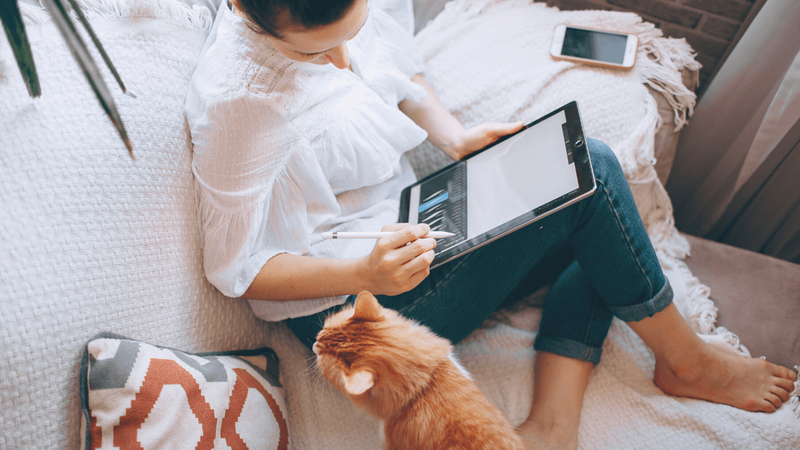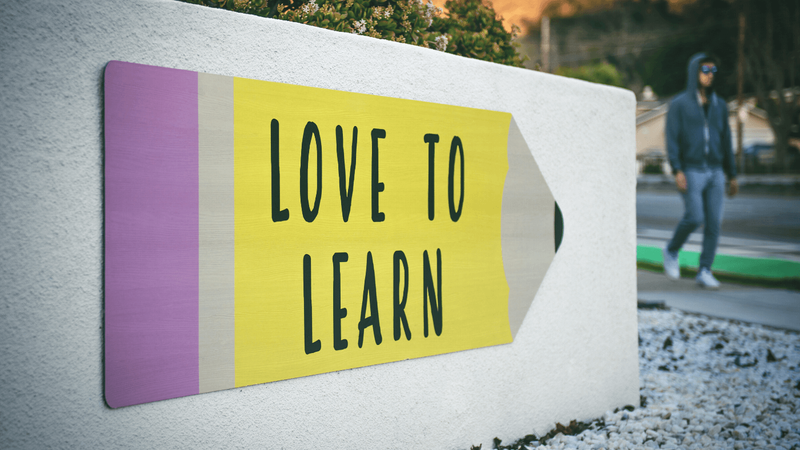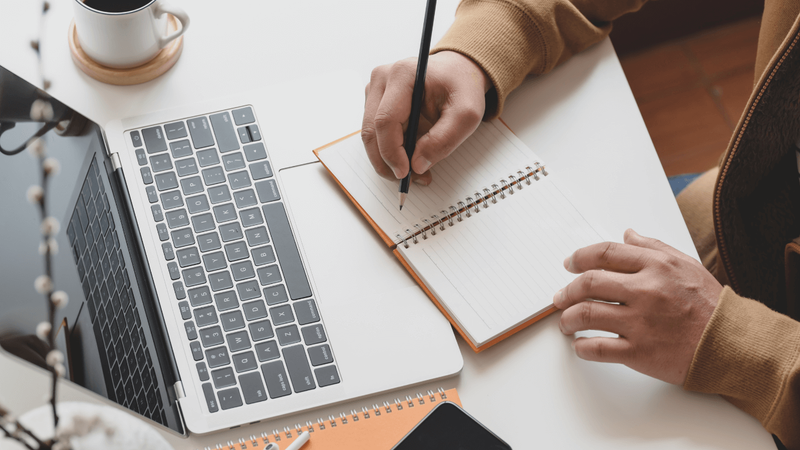Remote Work: Separating “Work” from “Home”

The ongoing Covid-19 pandemic has drastically altered how we work. For those who still have their jobs, it might be time to prepare for sustained remote work. In fact, if we are to consider James Altucher’s argument, remote work might well become the norm once the pandemic is behind us. For some, this is a welcome, long-overdue change. To some others, this can be quite the source of anxiety.
Regardless of how we feel, it’s worth reminding ourselves that very few homes are designed to accommodate remote work on a long-term basis. The situation has thus necessitated some brave thinking and action on our part. Remote work, after all, diminishes the boundaries between “work” and “home,” and this is no small matter.
Besides, not everyone can afford to create an exclusive workstation in their homes. Some may not have the money for this, and some may just not have space, and some may have neither. So what follows mainly addresses those who have no choice but to improvise to accommodate working from home.
At the same time, working from home can be a rather pleasant experience, especially since we can afford to be creative about dealing with problems. This is due of course to the simple fact that we have more agency in our homes: we have more control over the environment, which means we can do things we couldn’t really do all that freely at the workplace.
Remote Work Is Conducive to Experimentation
For instance, let’s consider the really off-beat example of working from bathrooms. Although this is becoming an increasingly common occurrence, the growth of this practice was documented as early as 2013. Since an unprecedented number of people are now working from home it is no surprise that the practice has become more common. Unsurprisingly, the very idea does repel some people, but to many, it is also a great way to kill stress or seek some quiet and privacy while working.
This is precisely the sort of creative solution that is available to remote workers who work from home today. Again, this is not at all to say that working from ‘the John’ is a universally applicable practice. Or that it solves our problems altogether. Even if this does work really well for you, it goes without saying that taking calls from the John might well be a recipe for disaster. It also requires immaculate hygiene to say the least.
However, this is simply to point out that working remotely means greater room for experimentation. We have to remember that what works for some might not necessarily work for others. Indeed, even hacks and tricks we tend to benefit from might not always work for us. This means the best way to deal with remote work-related stress is experimentation.
Behavioral Psychology and Experimentation
The working from the bathroom example also perfectly illustrates one of the most salient insights generated by behavioral psychology. For the sake of clarity, let’s make this a two-pronged insight:
(i) our mental states and processes—and thinking, in general—are influenced by our surroundings (in fact, some behaviorists go so far as to say that there can be no response without a stimulus, which is a rather contentious claim)
(ii) the best way to change our thought patterns and mental states is by making changes to our environment; some changes have positive effects, whereas others engender negative effects
These insights are remarkably simple and applicable to day-to-day life, especially to the remote work situation. Foremost, do not beat yourself up if adjusting to remote work has been difficult. We must acknowledge that prior to the pandemic most of our lives were based almost entirely on the clear distinction between work and home.
There certainly isn’t a one-size-fits-all approach, but it is possible to separate “work” from “home” and make remote work less stressful. Whether you’re a parent\single parent who also has to take care of your child’s needs and education or a single person, it is important to identify external triggers of stress and anxiety. Similarly, it is essential to identify and surround yourselves with feel-good stimuli.
In essence, the takeaway from behavioral psychology is that we can make changes to our surroundings to alleviate stress and anxiety.
This can mean working from the balcony for short bursts, or by a window. Or lighting a scented candle or incense. If space is hard to come by, now is the perfect time to declutter. Spend the weekend going through your clutter; donate things you haven’t used in a long time. Dealing with clutter this way is doubly beneficial: first, decluttering improves mental health; second, donating to charity or helping the needy also improves self-worth. The most obvious is that your home will be more conducive for remote work.
Simply put, working from home means you have more autonomy over how you work. You can even schedule breaks and take short walks in your neighborhood. Physical distancing and mask-wearing are essential if you do decide to take a walk. If your sleep cycle has gone for a toss, you can even squeeze in a couple of 15-minute nap breaks during your work hours. If you do work from the bathroom make sure it is clean and safe.
If you’re the kind who likes to listen to podcasts or music while working, make the most of it. You don’t have to use earphones all the time. This is especially applicable to single-person households. On the other hand, if you do live with friends or family, make sure you are not disturbing them by playing it too loud. In short, be imaginative. Do your best to reduce or eliminate negative triggers. But remember that controlling your environment does not solve all your problems. This battle with mental health is also an internal battle after all.
Cognitive Psychology: Some Helpful Insights
Cognitive psychology, unlike behavioral psychology, studies the internal, which means the disciplines complement each other. The cognitive perspective is essential because it shows us that we are not at the mercy of external stimuli. If we can’t make changes to our environment, we can nonetheless try and change how we think. In his work on cognition and human action, Bruce Goldstein shows that the discipline is especially useful for comprehending the contours of everyday experience. Here’s why.
The discipline suggests that we must go further than merely observing the physical symptoms of anxiety and stress. In fact, it urges us to assess the physical symptoms in relation to the mental states that accompany them. For instance, your stress may not just be caused by a cluttered workspace but also by a perceived lack of job security. In this case, making changes to your environment is not really going to help you.
With the economy taking a bad hit and job security being rather low, many of us are also worried that making extensive changes to our homes to accommodate remote work might be futile. What if I get furloughed after making all these changes? What, moreover, if my new job does not offer remote work? These are extremely valid concerns. If you do feel this way talk to your HR or your reporting manager to get an accurate account of the situation. If left unaddressed, this can, ironically enough, make our efforts to create a stress-free, effective working space in our homes itself a cause of stress.
Additionally, you can also try and make a habit of observing your thoughts and thought patterns. In fact, cognitive therapy mainly aims to enable clients to (i) observe thoughts and mental states, and (ii) learn how to develop positive patterns of thinking. Deep breathing is another proven technique to alleviate stress and anxiety. Remarkably enough, deep breathing alleviates the physical and cognitive symptoms of stress.
Finally, there’s also the tried-and-tested method of talking to a friend or a loved one. With restrictions being gradually eased, you can also socialize outdoors. Just remember to be very responsible. It is also perfectly alright to decline invitations to socialize outdoors. Don’t make accepting invitations a cause of anxiety. You can politely decline and make up for it with an earnest phone or video call.
Author Bio:
Dennis Wesley is an independent educational researcher. His interests include interdisciplinary practices and methods. He mainly writes about mental health, academia, and sustainability. You can follow his personal blog and Twitter here and here respectively.
Related Posts:


Featured Remote Jobs
 Opened 5 days ago Featured Job Remote Job
Opened 5 days ago Featured Job Remote Job Opened 5 days ago Featured Job Remote Job
Opened 5 days ago Featured Job Remote Job Opened 11 days ago Featured Job Remote Job
Opened 11 days ago Featured Job Remote Job Closes in 12 days Featured Job Remote Job
Closes in 12 days Featured Job Remote Job Closes in 12 days Featured Job Remote Job
Closes in 12 days Featured Job Remote Job Closes in 9 days Featured Job Remote Job
Closes in 9 days Featured Job Remote Job Closes in 6 days Featured Job Remote Job
Closes in 6 days Featured Job Remote Job Closes in 5 days Featured Job Remote Job
Closes in 5 days Featured Job Remote Job Closes in 4 days Featured Job Remote Job
Closes in 4 days Featured Job Remote Job
